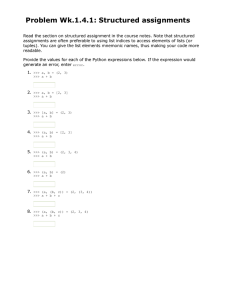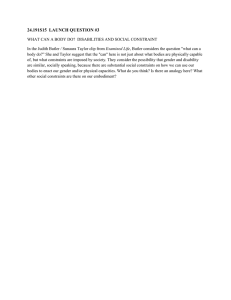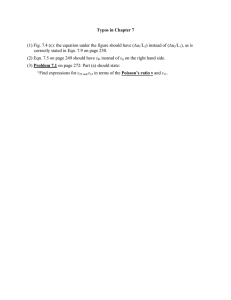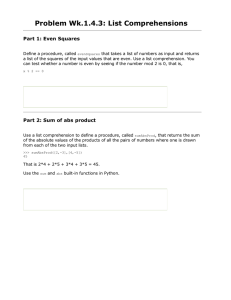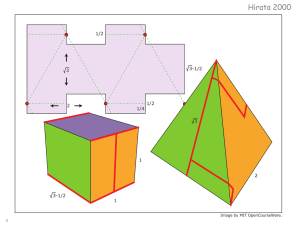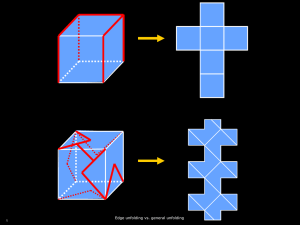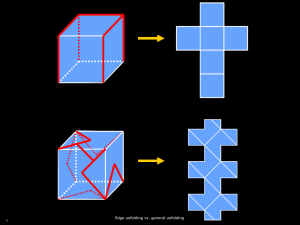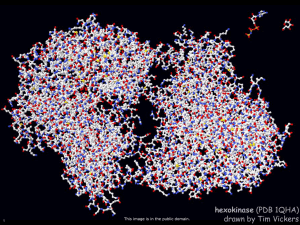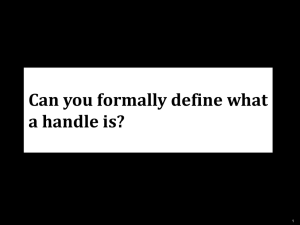Why does having a hole in your
advertisement
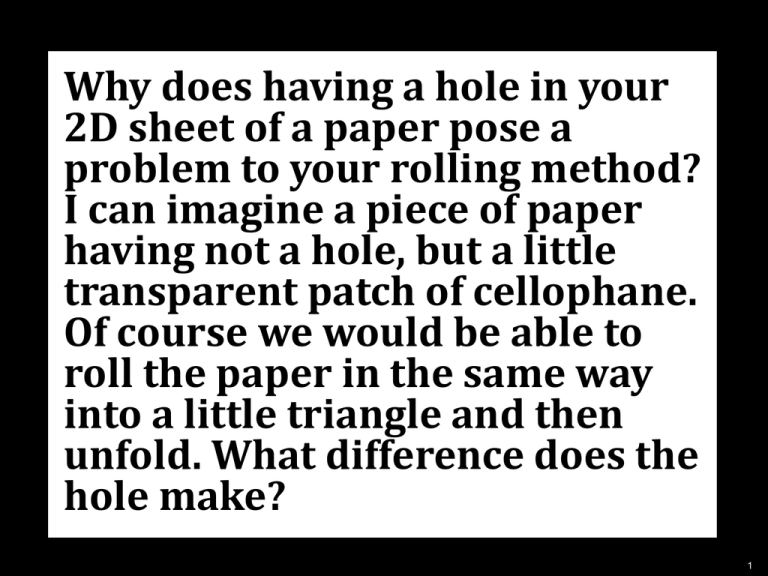
Why does having a hole in your 2D sheet of a paper pose a problem to your rolling method? I can imagine a piece of paper having not a hole, but a little transparent patch of cellophane. Of course we would be able to roll the paper in the same way into a little triangle and then unfold. What difference does the hole make? 1 (rt , ρt) P = r0(P) rt(P) r1(P) T wt (f, λ ) w1 = f(T) f(P) = S (f0r1-t , ρ1-t) Images by MIT OpenCourseWare. 2 Have there been any investigations into linkages that allow for points that can “slide” along edges? 3 I made a linkage from paper strips to demonstrate how a parallelogram can flip into a contraparallelogram. But, I didn’t understand why this flippage breaks the gadgets. 4 (A) B A C x α D E α y (B) (C) A B A B C E D D E C Images by MIT OpenCourseWare. 5 Created from Cinderella applet by Erik Demaine: http://courses.csail.mit.edu/6.849/fall10/lectures/ L08_applets/L08_Contraparallelogram.html. This image is in the public domain, and is available through Oxford Journals. Source: Kempe, A. B. On a General Method of describing Plane Curves of the nth Degree by Linkwork, 1876. 6 Could you go over the fix for the contraparallelogram gadget again? 7 d y (A) c (B) (C) a2+c2 c a+b a a x a b b b d b d q s a b2+c2 p r s c r a c x q p b x (A) (B) Images by MIT OpenCourseWare. 8 Image of "Cindy" by Jim Loy removed due to copyright restrictions. 9 “Faster” Arthur Ganson Courtesy of Arthur Ganson. Used with permission. To view video: http://www.youtube.com/watch?v=JJvK47ncVjU. 10 In the case where 𝒅 = 𝟑 and the output follows a surface …, do we have two degrees of freedom in the linkage (to account for the two-dimensional surface)? 11 Has anyone looked at a Kempe construction for curves not represented by polynomials? In particular, for piecewisedefined curves … say … cubic splines? The intersection gadget is clear, but what’s the union gadget? 12 I would definitely be interested in learning more about these axioms. It seems so mindboggling (at least, from someone used to compass-andstraightedge constructions) that one axiom […] would make the difference between solving fourth-degree and any-degree polynomials. 13 Photographs of drafting compass, straight-edge, and construction demos removed due to copyright restrictions. 14 HUZITA AXIOMS (1) (2) (3) (4) (5) (6) HATORI AXIOM Image by MIT OpenCourseWare. 15 θ θ θ/3 [Abe 1970s] a a/b = 3 2 b Images by MIT OpenCourseWare. [Messer 1985] 16 Courtesy of Robert J. Lang. Used with permission. 17 Courtesy of Robert J. Lang. Used with permission. 18 n (A) n (B) (C) (D) Image by MIT OpenCourseWare. [Demaine & Demaine 2000] 19 𝑘-gon 𝑘-hat [Demaine, Demaine, Lubiw 1999] 20 Screencap of animation of rotating truncated tetrahedron removed due to copyright restrictions. http://en.wikipedia.org/wiki/File:Truncatedtetrahedron.gif by Cyp 21 MIT OpenCourseWare http://ocw.mit.edu 6.849 Geometric Folding Algorithms: Linkages, Origami, Polyhedra Fall 2012 For information about citing these materials or our Terms of Use, visit: http://ocw.mit.edu/terms.
